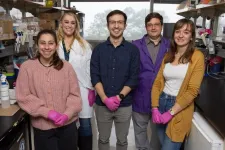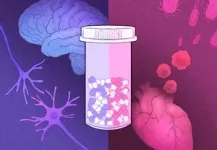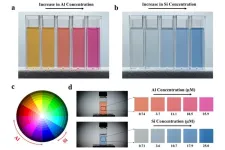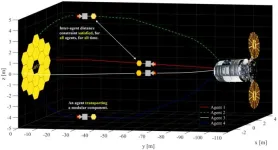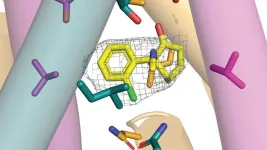(Press-News.org) LA JOLLA (February 14, 2025)—Antidepressants like Prozac are commonly prescribed to treat mental health disorders, but new research suggests they could also protect against serious infections and life-threatening sepsis. Scientists at the Salk Institute have now uncovered how the drugs are able to regulate the immune system and defend against infectious disease—insights that could lead to a new generation of life-saving treatments and enhance global preparedness for future pandemics.
The Salk study follows recent findings that users of selective serotonin reuptake inhibitors (SSRIs) like Prozac had less severe COVID-19 infections and were less likely to develop long COVID. Another study found that Prozac—also known as fluoxetine—was effective in protecting mice against sepsis, a life-threatening condition in which the body's immune system overreacts to an infection and can cause multi-organ failure or even death. By identifying a mechanism to explain fluoxetine’s surprising defense-boosting effects, Salk researchers have brought fluoxetine and potentially other SSRIs closer to clinical testing for use against infections and immune disorders.
The findings were published in Science Advances on February 14, 2025.
“When treating an infection, the optimal treatment strategy would be one that kills the bacteria or virus while also protecting our tissues and organs,” says Professor Janelle Ayres, holder of the Salk Institute Legacy Chair and Howard Hughes Medical Institute Investigator. “Most medications we have in our toolbox kill pathogens, but we were thrilled to find that fluoxetine can protect tissues and organs, too. It’s essentially playing offense and defense, which is ideal, and especially exciting to see in a drug that we already know is safe to use in humans.”
While our immune systems do their best to protect us against infections, sometimes they can overreact. In sepsis, the inflammatory response spins so out of control that it starts damaging a person’s own tissues and organs to the point of failure. This same overreaction is also characteristic of severe COVID-19 illness.
An obvious solution would presumably be to suppress the inflammatory response, but doing so can actually make patients more vulnerable to their initial infection—and more susceptible to new ones. Timing is also critical, as immunosuppressive drugs need to be administered before any tissue damage has taken place.
Instead, an ideal treatment would 1) proactively control the intensity and duration of the immune response to prevent any bodily damage and 2) kill the infection that puts the body at risk to begin with.
To understand what SSRIs might be doing in this context, the researchers studied mice with bacterial infections and separated them into two categories: one pretreated with fluoxetine and the other not. Excitingly, they saw the mice pretreated with fluoxetine were protected from sepsis, multi-organ damage, and death. The team then launched a series of follow-up experiments to make sense of these effects.
First, they measured the number of bacteria in each mouse population eight hours after infection. Mice treated with fluoxetine had fewer bacteria at this stage, signifying a less severe infection. The findings demonstrated that fluoxetine had antimicrobial properties, which allowed it to limit bacterial growth.
Next, the researchers measured the levels of different inflammatory molecules in each group. They saw more anti-inflammatory IL-10 in their pretreated populations and deduced that IL-10 prevented sepsis-induced hypertriglyceridemia—a condition in which the blood contains too many fatty triglycerides. This enabled the heart to maintain the proper metabolic state, protecting the mice from infection-induced morbidity and mortality.
The team decoupled this IL-10-dependent protection from multi-organ damage and death from their earlier discovery of fluoxetine’s antimicrobial effects, in turn revealing the drug’s dual-purpose potential to 1) kill pathogens and 2) alleviate infection-induced damage to the body.
To understand how fluoxetine’s influence on serotonin levels might be contributing to these effects, the researchers also looked at two new mouse populations: Both were pretreated with fluoxetine, but one had circulating serotonin, while the other did not. Circulating serotonin is a little chemical messenger that travels your brain and body to regulate things like mood, sleep, and pain, and is the main target for fluoxetine’s mental health effects. They found that fluoxetine’s positive health outcomes were entirely unrelated to circulating serotonin—regardless of whether the mice had serotonin in circulation, they experienced the same infection defense benefits from fluoxetine.
"That was really unexpected, but also really exciting,” says study first author Robert Gallant, a former graduate student researcher in Ayres’ lab. “Knowing fluoxetine can regulate the immune response, protect the body from infection, and have an antimicrobial effect—all entirely independent from circulating serotonin—is a huge step toward developing new solutions for life-threatening infections and illnesses. It also really goes to show how much more there is to learn about SSRIs.”
Ayres and Gallant say their next step is to explore fluoxetine dosing regimens appropriate for septic individuals. They’re also eager to see whether other SSRIs can have the same effects.
“Fluoxetine, one of the most prescribed drugs in the United States, is promoting cooperation between host and pathogen to defend against infection-induced disease and mortality,” says Ayres, also the head of Molecular and Systems Physiology Laboratories at Salk. “Finding dual protective and defensive effects in a repurposed drug is really exciting.”
Other authors include Karina Sanchez, Emeline Joulia, and Christian Metallo of Salk and Jessica Snyder of the University of Washington.
The work was supported by the National Institutes of Health (DPI AI144249, R01 AI14929, F31 AI169988, T32 GM007240-43, T32 GM133351, NCI CCSG: P30CA014195) and the NOMIS Foundation.
About the Salk Institute for Biological Studies:
Unlocking the secrets of life itself is the driving force behind the Salk Institute. Our team of world-class, award-winning scientists pushes the boundaries of knowledge in areas such as neuroscience, cancer research, aging, immunobiology, plant biology, computational biology, and more. Founded by Jonas Salk, developer of the first safe and effective polio vaccine, the Institute is an independent, nonprofit research organization and architectural landmark: small by choice, intimate by nature, and fearless in the face of any challenge. Learn more at www.salk.edu.
END
New study explains how antidepressants can protect against infections and sepsis
Salk scientists discover SSRI Prozac regulates immune response and prevents sepsis in mice, demonstrating potential new use for the popular drug
2025-02-14
ELSE PRESS RELEASES FROM THIS DATE:
Research reveals how Earth got its ice caps
2025-02-14
University of Leeds news
Embargoed until 14 February 2025 (19:00 GMT)
---
The cool conditions which have allowed ice caps to form on Earth are rare events in the planet’s history and require many complex processes working at once, according to new research.
A team of scientists led by the University of Leeds investigated why Earth has existed in what is known as a 'greenhouse' state without ice caps for much of its history, and why the conditions we are living in now are so rare.
They found ...
Does planetary evolution favor human-like life? Study ups odds we’re not alone
2025-02-14
UNIVERSITY PARK, Pa. — Humanity may not be extraordinary but rather the natural evolutionary outcome for our planet and likely others, according to a new model for how intelligent life developed on Earth.
The model, which upends the decades-old “hard steps” theory that intelligent life was an incredibly improbable event, suggests that maybe it wasn't all that hard or improbable. A team of researchers at Penn State, who led the work, said the new interpretation of humanity’s origin increases the probability ...
Clearing the way for faster and more cost-effective separations
2025-02-14
CLEVELAND—The process of separating useful molecules from mixtures of other substances accounts for 15% of the nation’s energy, emits 100 million tons of carbon dioxide and costs $4 billion annually.
Commercial manufacturers produce columns of porous materials to separate potential new drugs developed by the pharmaceutical industry, for example, and also for energy and chemical production, environmental science and making foods and beverages.
But in a new study, researchers at Case Western Reserve University have found these ...
Researchers develop a five-minute quality test for sustainable cement industry materials
2025-02-14
CHAMPAIGN, Ill. — A new test developed at the University of Illinois Urbana-Champaign can predict the performance of a new type of cementitious construction material in five minutes — a significant improvement over the current industry standard method, which takes seven or more days to complete. This development is poised to advance the use of next-generation resources called supplementary cementitious materials — or SCMs — by speeding up the quality-check process before leaving the production floor.
Due ...
Three Texas A&M professors elected to National Academy Of Engineering
2025-02-14
Drs. Vanderlei Bagnato, Rodney Bowersox and Don Lipkin from Texas A&M University’s College of Engineering have been elected to the National Academy of Engineering (NAE) Class of 2025, joining 128 new members and 22 international members. This is one of the highest professional honors for engineers.
“Congratulations to Drs. Bagnato, Bowersox and Lipkin for achieving this recognition. This prestigious honor reflects their groundbreaking contributions to engineering and underscores the exceptional talent within our faculty,” said Dr. Robert H. Bishop, vice chancellor and dean of Texas A&M ...
New research sheds light on using multiple CubeSats for in-space servicing and repair missions
2025-02-14
As more satellites, telescopes, and other spacecraft are built to be repairable, it will take reliable trajectories for service spacecraft to reach them safely. Researchers in the Department of Aerospace Engineering in The Grainger College of Engineering, University of Illinois Urbana-Champaign are developing a methodology that will allow multiple CubeSats to act as servicing agents to assemble or repair a space telescope. Their method minimizes fuel consumption, guarantees that servicing agents never come closer to each other ...
Research suggests comprehensive CT scans may help identify atherosclerosis among lung cancer patients
2025-02-14
Several cardiovascular risk factors, such as advanced age and smoking history, are prevalent among lung cancer patients at the time of the diagnosis and increase their risk of future heart disease, according to a new study being presented at ACC’s Advancing the Cardiovascular Care of the Oncology Patient course. Comprehensive assessments are needed in this vulnerable group to improve survival outcomes and quality of care for cancer patients.
Heart disease and cancer are the leading causes of death in the United States. Smoking is a shared risk factor for lung cancer and cardiovascular disease, and lung cancer patients have an amplified mortality rate with the presence of ...
Adults don’t trust health care to use AI responsibly and without harm
2025-02-14
A study finds that 65.8% of adults surveyed had low trust in their health care system to use artificial intelligence responsibly and 57.7% had low trust in their health care systems to make sure an AI tool would not harm them.
The research letter was published in JAMA Network Open.
Adults who had higher levels of overall trust in their health care systems were more likely to believe their providers would protect them from AI-related harm.
The letter, authored by Jodyn Platt, Ph.D., of the Department of Learning Health Sciences at University of Michigan Medical School and Paige Nong, Ph.D., of the University of Minnesota School of Public Health comes from survey of a nationally ...
INSEAD webinar on the dual race to AI & global leadership
2025-02-14
Digital@INSEAD is hosting a free TECH TALK X webinar “The Dual Race to AI & Global Leadership” on Wednesday, 19 February 2025 7.00 am ET / 1.00 pm CET (Duration: 60 min).
The TECH TALK will be featuring a discussion between Tim Gordon (MBA’00D), Partner, Best Practice AI and Theos Evgeniou, INSEAD Professor of Technology & Business and Director of Executive Programs in AI.
Tim, an INSEAD alumnus with over 20 years of international experience in digital transformation, global strategy and innovation, will join Theos to explore the two critical AI races reshaping our world: ...
Ketamine: From club drug to antidepressant?
2025-02-14
Ketamine has received a Hollywood makeover. It used to be known as a rave drug (street name special K) and cat anesthetic. However, in recent years, some doctors have prescribed ketamine to treat conditions from post-traumatic stress disorder to depression. “The practice is not without controversy,” notes Cold Spring Harbor Laboratory (CSHL) Professor Hiro Furukawa.
‘Should we give a hallucinogen to patients in compromised mental states?’ wonder ketamine’s skeptics. The controversy came to ...
LAST 30 PRESS RELEASES:
Why does chronic back pain make everyday sounds feel harsher? Brain imaging study points to a treatable cause
Video messaging effectiveness depends on quality of streaming experience, research shows
Introducing the “bloom” cycle, or why plants are not stupid
The Lancet Oncology: Breast cancer remains the most common cancer among women worldwide, with annual cases expected to reach over 3.5 million by 2050
Improve education and transitional support for autistic people to prevent death by suicide, say experts
GLP-1 drugs like Ozempic could cut risk of major heart complications after heart attack, study finds
Study finds Earth may have twice as many vertebrate species as previously thought
NYU Langone orthopedic surgeons present latest clinical findings and research at AAOS 2026
New journal highlights how artificial intelligence can help solve global environmental crises
Study identifies three diverging global AI pathways shaping the future of technology and governance
Machine learning advances non targeted detection of environmental pollutants
ACP advises all adults 75 or older get a protein subunit RSV vaccine
New study finds earliest evidence of big land predators hunting plant-eaters
Newer groundwater associated with higher risk of Parkinson’s disease
New study identifies growth hormone receptor as possible target to improve lung cancer treatment
Routine helps children adjust to school, but harsh parenting may undo benefits
IEEE honors Pitt’s Fang Peng with medal in power engineering
SwRI and the NPSS Consortium release new version of NPSS® software with improved functionality
Study identifies molecular cause of taste loss after COVID
Accounting for soil saturation enhances atmospheric river flood warnings
The research that got sick veterans treatment
Study finds that on-demand wage access boosts savings and financial engagement for low-wage workers
Antarctica has lost 10 times the size of Greater Los Angeles in ice over 30 years
Scared of spiders? The real horror story is a world without them
New study moves nanomedicine one step closer to better and safer drug delivery
Illinois team tests the costs, benefits of agrivoltaics across the Midwest
Highly stable self-rectifying memristor arrays: Enabling reliable neuromorphic computing via multi-state regulation
Composite superionic electrolytes for pressure-less solid-state batteries achieved by continuously perpendicularly aligned 2D pathways
Exploring why some people may prefer alcohol over other rewards
How expectations about artificial sweeteners may affect their taste
[Press-News.org] New study explains how antidepressants can protect against infections and sepsisSalk scientists discover SSRI Prozac regulates immune response and prevents sepsis in mice, demonstrating potential new use for the popular drug
